50 Ways To Heal Your Gut
This post contains affiliate links. Learn what that means here. Also please note that I am not a doctor, and check out my disclaimer.
I started my health journey when I was diagnosed with Hashimoto’s. I thought that that’s what it was always going to be about… healing Hashimoto’s, healing hormones, and balancing my thyroid. I was in denial that I had digestive issues my whole life… I thought they were normal, and that it had nothing to do with my thyroid. However, nothing changed with my Hashimoto’s until I took control of my gut health and started the journey to heal my gut. I read all of the books, listened to all of the podcasts, saw all of the doctors, went to school to study nutrition, and slowly but surely, my very being morphed into a lifestyle rooted in gut health. Thus I’m here to tell you how to do the same with 50 ways to heal your gut!
The common misconception is that gut health only relates to digestive health and that if don’t have any obvious digestive issues like bloating or reflux, our gut health is fine. This is far from the truth! Our gut health is connected to everything in our body, such as…
- Mood
- Mental health
- Weight
- Energy
- Joint health
- Hormones
- Skin
- Cravings
- Digestive issues
- Autoimmunity like Hashimoto’s
- And more…
It’s not just folks like me with chronic illness who need some gut healing! We could all benefit from some short-term gut healing, and a lifestyle that’s more conducive to maintaining a healthier gut in general!
It’s not easy, and the path isn’t always clear! That’s why I’m sharing this extensive, slightly sassy list of all that I’ve learned through my own experience with leaky gut and my professional experience as a nutritional therapy practitioner.
50 Ways To Heal Your Gut
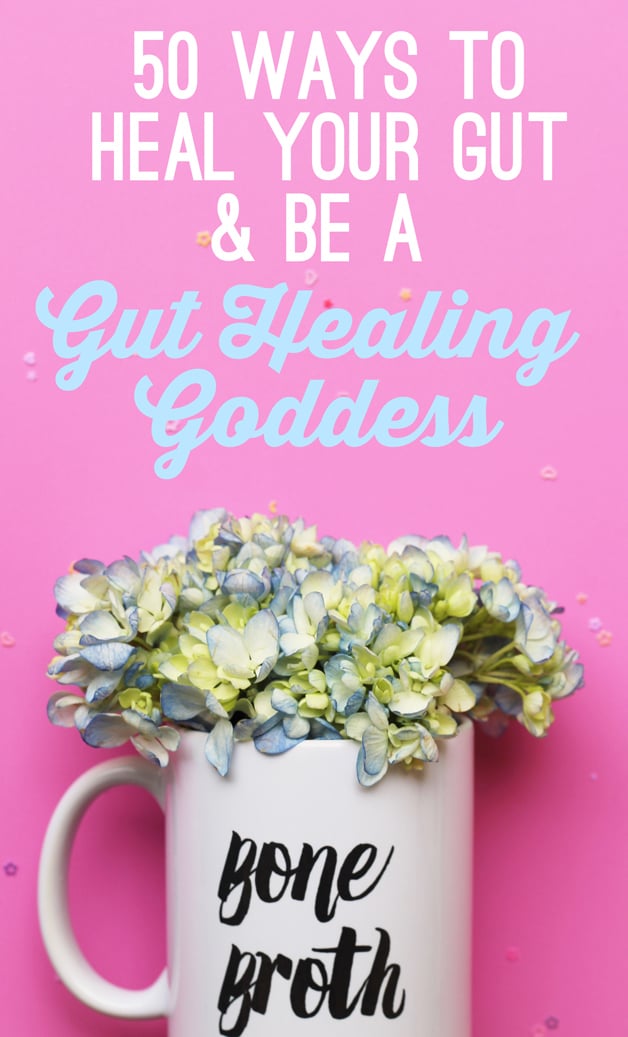
Gut Healing Diet Tips
1.Sip bone broth from your chalice like a boss
Bone broth is a gut healing powerhouse! It’s only of the easiest ways you can support your gut health with fairly minimal effort. I make homemade bone broth weekly and encourage my clients to do the same. Making your own perfect bone broth is a process, but here’s my favorite recipe for bone broth.
2. Feed your good gut bacteria
Feeding the good bacteria in your gut is crucial to the gut health process! Balancing the microbiome in our gut is at the center of keeping our gut healthy, and protecting us from illness. We need to feed our good gut bacteria with foods like sauerkraut, kefir, homemade yogurt, beet kvass, and other fermented veggies.
It is important to note that many with severe overgrowths or histamine intolerance may not be able to tolerate fermented foods. It’s fine to avoid fermented foods if necessary, but the goal is to heal to the point where they can be reintroduced.
3. Feast on easy to digest foods that are gut healing and nutrient rich
This I can’t stress enough. Not all food is easy to digest… even healthy foods. Just because veggies are good for you doesn’t mean that raw veggies are a good choice for your gut in particular. It’s very common for those with gut issues to have trouble with a myriad of veggies, and how you cook them matters!
For vegetables, try experimenting with them well cooked and pureed. I highly recommend introducing pureed veggie soups (like this carrot soup, and more in my 30 day gut healing guide) with are much easier on your digestion.
For proteins, go with meats that are slow cooked in broth like pot roast or beef stew as these are much more broken down and easier to digest.
4. Be a nutrient seeker first, before anything else
It’s sexy to cut out foods like gluten and soy, and less sexy to talk about adding in sardines and liver. However, sustainable wellness has so much to do with what you do eat rather than what you don’t.
View food nutrients, nourishment, and something to be grateful for. Our hormones, our enzymes, and our very body are made up of the food we eat! If you’re eating to heal your gut, keep the mindset that food is nourishment and that your meals should be giving your body something that it needs.
5. Exile gluten, soy & processed foods
These are just three of huge offenders when it comes to gut health, but they’re worth calling out on their own. Gluten, soy, and processed foods are all harmful to the gut lining and are best avoided for the long haul if possible.
Processed foods are clearly far from real food, and contain additives, sugars, oils, and more that do anything but nourish our gut. Modern gluten and soy are both often GMO, and also tear up our gut lining.
6. Chew your food 30-40 times per bite.
I know, I know that sounds like a lot… but your stomach doesn’t have teeth! Not chewing thoroughly can cause poor digestion and absorption of food, and incomplete enzyme and acid production.
7. Temporarily eliminate the following…
- Gluten
- Soy
- Processed food
- Processes sugar
- Grains (including corn)
- Alcohol & caffeine
- Legumes
- & Potentailly nuts, seeds, nightshades, etc. (see #9)
8. Focus on proper preparation of foods
If the GAPS diet teaches us anything, it’s that we to consider how food is prepared. Raw almonds are very different than soaked and sprouted, and fried meats are very different than slow cooked.
Focus on meats that are slow cooked, or cooked on low temperatures, vegetables that are very well cooked, and nuts/seeds that are soaked and sprouted. Not only are these foods easier on our digestive system, but the nutrients are easier to absorb.
9. Consider ushering in temporary gut healing approaches like AIP, GAPS, or Low-FODMAP, and then customize further! This journey is your own!
There is no one size fits all when it comes to gut healing protocols. We’re all bioindividuals and need to customize our approach! Here are just three templates worth mentioning…
- AIP. Designed for autoimmune disease.
- GAPS. Designed for autism, and used for many other gut issues.
- Low-FODMAP. Beneficial for IBS.
Though these are all great templates to follow, they’re just that… templates. I implore you to customize each approach further to fit your needs. If you have other intolerances, other needs, or need to combine approaches, do what you need to do to heal. You don’t need to fit into a box!
10. Sip raw celery juice first thing in the morning (and/or water with lemon/ apple cider vinegar)
Raw celery juice is great for influencing the stimulation of stomach acid production for better digestion, as well as ACV and lemon diluted in water! I recommend drinking 16 oz of celery juice in the morning on an empty stomach, and monitoring how it helps your digestion.
11. Find good sources of high quality, pastured meats
“Organic” isn’t enough when it comes to proteins. Organic really only suggests that the animals ate organic feed, however, we ideally don’t want animals eating feed at all. Just like people, animals get sick from processed foods like feed… we want them eating their natural diets! What you want to look for is grass-fed and pasture raised meats. Many areas have great local sources, but you can also source yours online.
12. Eat organ meats & wild caught fish regularly and well cooked veggies and healthy fats daily.
Organ meats like liver from high quality sources are packed full of nutrients, and healthy fats and wild caught fish are the same! Eat these often to give your body what it needs to heal.
Even if raw vegetables aren’t your friend, eat well cooked vegetables daily, and at every meal if possible to give yourself the phytonutrients and vitamins necessary to thrive.
As for healthy fats, focus on foods like avocado, coconut oil, olive oil, grass-fed ghee (if tolerated) and high-quality animal fats. Fats are necessary to help control inflammation, and poor quality fats like seed oils influence more inflammation.
13. Moderate your fruit intake
If you’re dealing with some sort of gut bacteria dysbiosis, you want to be careful with even natural sugar like fruit. First, you need to get at the root cause to see if this is your issue, but regardless, try and limit fruit to 1-2 servings a day.
14. Don’t eat the same foods every day.
Our bodies weren’t made to eat apples every single day as the modern grocery store allows. The true paleo way of eating is eating seasonally. Eating the same foods day in and day out while having compromised gut health can lead to reacting to those very same foods that you’re constantly eating.
Eat with the seasons, and try to rotate your foods on about a 4-day rotation or only eating the same foods a couple of times a week. For example, if you eat lots of sweet potato on Monday, try and wait until Friday until you eat a sweet potato again. This isn’t about perfection… it’s fine to deviate here and there. What’s important is to stay mindful that you’re getting a variety of foods every week!
15. Learn how to balance your meals
Balancing your macronutrient ratios within your meals so that you’re not spiking your blood sugar with too many carbs, or dropping it with too little fat and protein is important for digestion and long term satiation. This is an on going process that’s very individual to tweak, and there’s no one size fits all. You can start at filling up 40% of your plate with vegetables, 30% with fat, and 30% with protein, and go from there. Monitor how you feel, how hungry you are between meals, and how your digestion feels after eating.
16. Stop chugging water with meals
Diet culture tells us to chug water to control our appetite, but this actually dilutes our digestive juices and can interfere with digestion. Take small sips with meals, and drink the bulk of your water in between meals.
Gut Healing Lifestyle Interventions
17. Eat in a relaxed state & stop stressing around food.
This is easily one of the most important pieces of gut healing! We need to be in a relaxed, parasympathetic state to properly digest our food. If we’re watching a frustrating news story, driving in traffic, rushing out the door to work, or eating with unpleasant coworkers, we’re immediately impairing our digestion.
Create a routine to eat in a relaxed state. Turn off your phone 10 minutes before meals, take a few deep breaths, say a prayer or blessing, and be grateful for your food!
18. Focus on learning how to stop feeling left out & enjoy your new way of eating
19. Eliminate unnecessary stressors
Stress is one of the hardest things to tackle, but one of the most important. Stress is everywhere, so start small. What is the lowest hanging fruit of stress in your life that you can get rid of? Finding a new route to work? Hiring a sitter on Friday nights for a date night? Start there, and keep working to eliminate unnecessary stress going forward.
20. Practice daily/ weekly self-care
Self-care is an incredibly important part of any healing journey as our body needs to be relaxed to heal. Practice a small, daily self care routine like a 15-minute walk with your family, or 10 extra minutes in the morning to yourself and a larger weekly practice like going to a yoga class alone, or taking yourself out for tea.
21. Focus on something bigger than yourself
When I think of what has truly helped me heal and stop stressing over my own sickness, it’s been looking outside myself. Whether that be my relationship with God (who is SO much bigger than me) or helping thousands of others with my blog, it offers incredible perspective to realize that there is so much more out there than ourselves.
22. Practice gratitude
There’s always something to be grateful for. When we’re focusing on the good, we have less energy to focus on the bad. I’ve recently started a weekly gratitude journal, and it’s been such a blessing!
23. Take potential adrenal fatigue seriously
24. Shift your mindset when it comes to gut healing
25. Adopt a healthy exercise routine
This is different for everyone, but movement matters for a healthy body. Find what works for you and make space to do it a few times a week. That could just be walking, taking a yoga class, or light weight lifting, but whatever it is, make it something that you enjoy!
26. Socialize with others on the same journey
Support each other, share ideas, and build community! The internet creates an amazing space to find others who are on the same journey as you. Even just through searching hashtags on Instagram, or emailing fellow bloggers, I’ve made great friends with others who are on a gut healing journey.
27. Socialize in general
Human beings are social creatures and we need a community to thrive. Maybe you’re introverted like me and the thought of people around all the time makes your head spin, but I like to find ways to create family time, time with my husband, or just go out for tea with a friend every so often. It doesn’t have to be an overwhelming amount of socialization to make a difference in your life.
28. Find a way to make the lifestyle sustainable for you
No two people have the same journey. Though advice from others can be invaluable, I urge you to customize your journey to make it work for you! If something isn’t working, change it. It’s better to make changes to a lifestyle for sustainability than not live the lifestyle at all.
One of the best ways to make this lifestyle sustainable is find fun recipes that you love to eat. That’s why I focus on putting out comfort food recipes that are fun to eat, easy to make and still compliant with a healing lifestyle… like Sweet Potato Chicken Poppers 😉
29. Try Castor Oil Packs
Great for liver/gallbladder support which is important for fat digestion. Always check with a doctor!
31. Consider asking your doctor about coffee enemeas*
*Do this only with approval from your doctor.
32. Switch out toxic home care products and make up
My favorite brands are…
33. Get outside daily
Gut Healing Gadgets & Must Haves
34. Invest in an Instant Pot and/or good quality slower cooker
The perfect gadgets for soup!
35. Acquire a great high-speed blender
I love my vitamix for blending all of my pureed veggie soups!
36. Stock your pantry with turmeric, ginger and other soothing herbs.
37. Get some great cookbooks, like…
Gut Healing Supplementation & Support
38. Work with a doctor
Working one on one with someone to customize your protocol is invaluable and irreplaceable. There’s always a lot you can do with just diet and lifestyle to improve your general wellness and quality of life, but when it comes to legitimately healing your body, you need a doctor. There is no way around this. Here’s a blog post on finding a good doctor.
39. Get some legit functional testing done
Test don’t guess! If you think you may have SIBO, get a breath test. If you think you have dysbiosis, get a stool test. Don’t just blindly follow protocols… get answers to effectively execute.
40. Consider digestive supplement support
This is something to work with your doctor to ensure that it’s the right supplement protocol for you, but there is zero shame in digestive support.
41. Make sure your mineral status is balanced
We need to have sufficient levels of zinc in our body to properly heal from wounds. A damaged gut lining is just like a wound. If we’re zinc deficient, we can’t properly heal. This is another great thing to work on with a doctor.
42. Bring in support like collagen
43. Take a great probiotic
Gut Healing Education
44. Educate the heck out of yourself
Knowledge is power! Though it’s important to not actually treat yourself, it’s empowering to understand what’s actually going on with your body. Never stop learning!
45. Learn how digestion is actually supposed to work
Bad digestion=bad gut health. Master your digestion!
46. Work hard to find your root cause
Getting to the root cause is the only way to truly heal. Follow steps #44, #38, and #39 to dig deep into why you’re experiencing gut issues so you can heal them, rather than just prolonging the masking of symptoms.
47. Grab my e-book, The 30 Day Autoimmune Makeover Guide... written by yours truly 😉
I wrote this e-book specifically for those on a journey to eat nourishing foods, remove inflammatory foods, and nourish the gut. It’s full of meal plans, shopping list, recipes and more that are all anti-inflammatory.
48. Read the following books…
49. Follow the following blogs…
50. Listen to the following podcasts…
And a bonus 51… never give up!
Having good gut health is a lifestyle… not just a 30-day protocol. We need to always be learning, always forming new positive habits, and always striving for good health! Only then, does good health become sustainable long term.
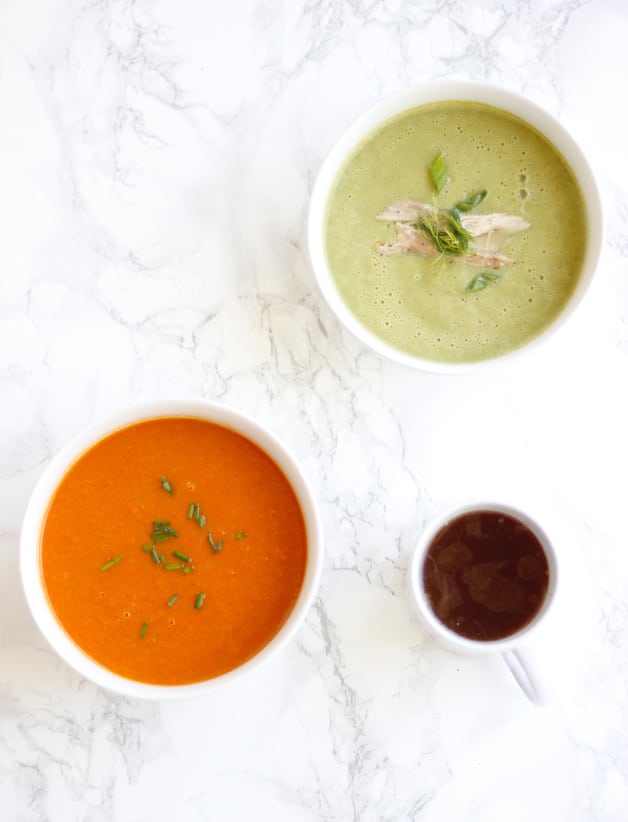
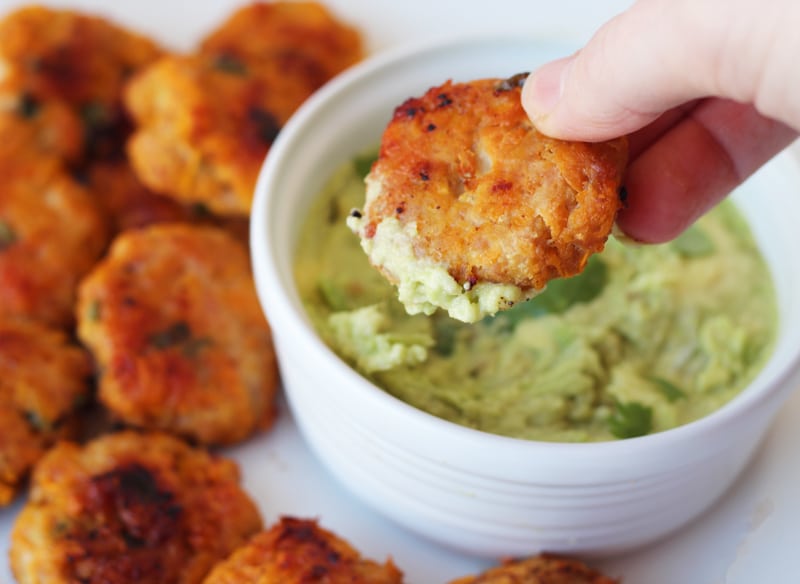
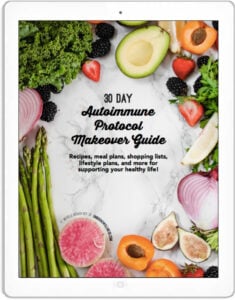
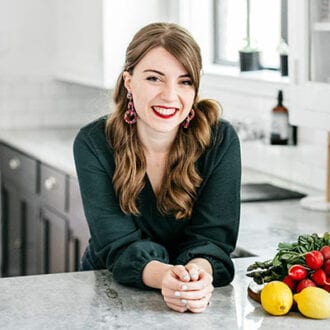
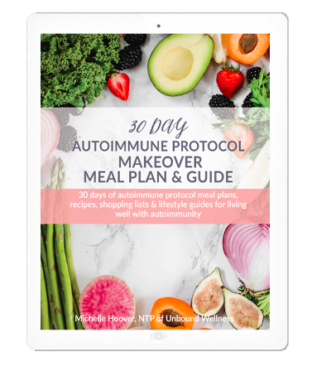


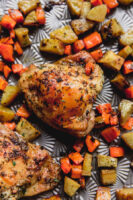
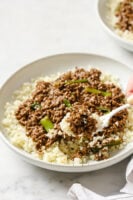

Pingback: It's Okay To Stumble In Your Health Journey & How To Pick Yourself Up - Unbound Wellness
hello. i love what you put together here. i have only one (unsolicited) suggestion. your recommendation to eat liver and other organ meats has me a bit curious. i understand and agree that liver contains lots of vitamins and nutrients; however, it also houses a lot of toxins, such as arsenic. anyhow, i wonder if consuming liver is worth the risk?
If you’re eating high quality liver like grass-fed and pasture raised, it’s full of nutrients 🙂
It’s my understanding that although the liver is indeed a “ filter” it does not hold onto the toxins but Eliminates them through the bowel. Pasture raised Liver has lots of nutrients and is not the toxic machine we’ve been taught. Our liver does the same for us!